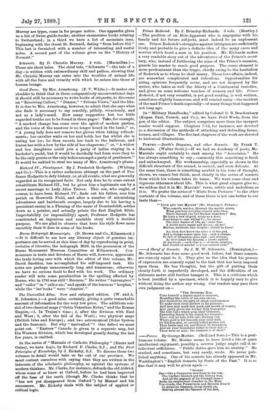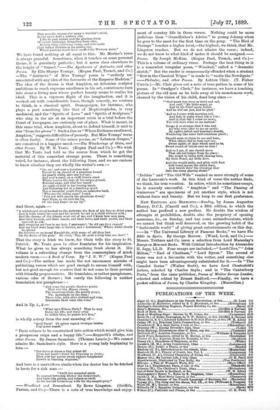Powner.—Death's Disguises, and other Sonnets. By Frank T. Marzials. (Walter
Scott.)—If we had an Academy of poets, Mr. MasziSls ought certainly to rank among the "Associates." He has always something to say ; commonly this something is fresh and mihackneyed. His workmanship, especially as shown in the difficult structure of the sonnet, is correct, and even delicate. At the same time, there is something morbid in his tone of thought, shown, we cannot but think, most clearly in the series of sonnets from which his volume takes its name. We want some clear and vigorous utterance about life. This is what great singers give us ; we seldom find it in Mr. Marzials' verse, subtle and melodious as it is. We prefer the series of "Hints from Pictures" to the other contents of the volume, and of these there is not one better to our taste than— '"LOVE AND TEE MAIDEN' (Mr. St.021110pe'S Picture.) Who eometh, maiden, through the myrtle grove,
What gracious stripling cometh unto thee, There through the full-flushed oleanders ? See, He bath a bow of gold, wings as a dove. Soul-wings to soar withal fir, far above
The level wastes of life, an I enter free
A world more ample and divine ; ah me I Maiden, methinks this striplin should be Love!
Ay, thou dost know the adve it of the And a change comes upon the such a c So full of tremulous pure ligh , and strange. As over-steals the mounts it snows untrod At daybreak ,—such that a re of sweet surprise, And wealth of wonder in those earnest eyes."
A Sheaf of Sonnets. By J. M. W. Schwartz. (Remington.)— Mr. Schwartz has done some good work before, but these sonnets are scarcely equal to it. They give us the idea that his powers of expression are scarcely equal to the task that has been imposed upon them. He has thoughts, but the gift of putting them clearly forth is imperfectly developed, and the difficulties of an elaborate metre still further hamper it. This is a criticism which is best justified by a specimen, which it is happily easy to give without doing the author any wrong. Our readers may pass their own judgment on—
"THE DIVINING ROD.
MAO himself a master-mind is measure,
Rounding the circle of his own excess, And doomed by strength of silent consciousness
To make such circle perfect in his pleasure ;
And men may mark and mock and mouth at leisure, And justly prove the worker doth transgress The tidy rules which prop their littleness, Uprooting fences in his search for treasure:
True—but he tells with sure divining rod
Where gold is hid beneath your solid wall, Or kitchen.plot, or smooth-rolled garden sod.
Then fruits may rot, and flowers be down-trod,
And all your boundaries totter to their fall :— These were of man; the treasure is of God."
—Poems. By George Monne. (Bell and Sons.)—This is a post- humous volume. Mr. Morine seems to have lived a life of quiet intellectual enjoyment, possibly a severer judge might call it in- tellectual selfishness. "Public duties gave him no anxiety." He studied, and sometimes, but very rarely, wrote. He never pub- lished anything. One of his sonnets has already appeared in Mr. Waddington's "English Sonnets by Poets of the Past." It is so fine that it may well be given again :— " BIINSET.
Day—like a Conqueror marching to his rest, The warfare finished and the victory won, And all the pageant of his triumph done— Seeks his resplendent chamber in the West. You clouds, like Parsuivante and Heralds dress d In gorgeous blazonry, troop slowly on, Bearing abroad the banners of the Bun,
That proudly stream o'er many a warrior's crest. In the azure field a solitary star Lifts its pale signal, and the glorious train Of errant sunbeams, straggling from afar, Reform their glittering ranks, and join again Their father Plicebus in his golden ear, Whose panting steeds have snuffed the Western main."
We have found nothing at all equal to this. Mr. Morine's verse is always graceful. Sometimes, when it touches on some personal theme, it is genuinely pathetic ; but it never rises elsewhere to the height of "Sunset."—The Apotheosis of Antinoils, and other Poems. By Ella Sharpe Youngs. (Kegan Paul, Trench, and Co.) —The "Antinoiis " of Miss Youngs' poem is "entirely un- associated with any idea of the favourite of the Emperor Hadrian." The idea of the drama is that Amphion, an Athenian sculptor ambitious to reach supreme excellence in his art, contrives to turn into stone a living man whose perfect beauty seems to realise his ideal. This is a vigorous flight of the imagination, and it is worked out with considerable force, though scarcely, we venture to think, in a classical spirit. Demogorgon, for instance, who plays a part something like that of Mephistopheles, is very medis3val, and the "Spirits of Love" and "Spirits of Sculpture," who sing in the air at an important crisis in a trial before the Court of .Areopagus, are curiously out of place. What is meant, in this same trial, when Amphion, about to defend himself, is said to rise "from the ybreos"? Such a line as "Whom Eridanus swallowed, Amphion," suggests difficulties of prosody. But Miss Youngs' verse is often faulty. Some of the minor poems, as "Lebanon Grapes," are conceived in a happier mood.—The Wanderings of Oisin, and other Poems. By W. B. Yeats. (Kegan Paul and Co.)—We wish that Mr. Yeats had told us the source from which he got the material of this somewhat strange poem. There is something weird, for instance, about the following lines, and we are curious to know whether they are wholly the writer's own :—
"On, on! and now a hornless deer Passed by us, chased of a phantom hound
All pearly white, save one red ear;
And now a maid, on a swift brown steed Whose hooves the tops of the surges grazed, Harried away, and over her raised An apple of gold in her tossing hand; And following her at a headlong speed Was a beautiful youth from an unknown land. 'Who are the riding ones?' I said. ' Fret not with speech the phantoms dread,' Said Niam, as she laid the tip Of one long finger on my lip."
And these, again :—
"A whitebeard stood hushed on the pathway, the flesh of his face as dried grass And in folds round his eyes and his mouth, he sad as a child without milk; And the dreams of the islands went out of me, and I knew how men pass, And their hounds, and their steeds, and their loves, and their youth, and their
eyes soft as silk.
And wrapping my face in my hair, I murmurel, 'In old age they ceased,'
And my tears were large like to berries, and I murmured, Where white clouds lie spread On Crevroe or on broad Xnockfefin, with many of old they fast On the floors of the gods.' He cried, 'Nay, the gods a long time are dead.'"
That the story is Irish we know, for Oisin tells the story to St. Patrick. Mr. Yeats goes to other fountains for his inspiration. What he gives us has always something fresh about it. His volume is a refreshing change from the commonplace of much modern verse.—A Book of Verse. By "J. N. W." (Kegan Paul and Co.)—The author has made the not uncommon mistake of publishing verses which are good enough to amuse himself with, but not good enough for readers that do not come to their perusal with friendly prepossessions. He translates, or rather paraphrases, various odes of Horace ; but surely the following is neither translation nor paraphrase :—
" And some the purple shadows praise. That o'er the /Evan sweep, The wondrous blues, the pearly grays, The moonlight on the deep: Those hills, with olive clothed and vine, Intoxicate their souls like wine."
And in Ep. i, 2 :— " What says Prince Paris ? That he may Enjoy his life, and royal sway
In selfish bliss, he pleads he's free," is wholly astray from the real meaning of—
"Quid Paris? Ut salves regnet vivatque beaus Cogi posse negat."
"Paris refuses to be constrained into action which would give him a prosperous reign and a happy life."—Raygarth's Gladys, and other Poems. By James Saunders. (Thomas Laurie.)—We cannot admire Mr. Saunders's style. Here is a young lady beginning to love :—
"She dares at times a tiny goblet fill From her heart's fount for Phantasy to drain; Then o'er her nerves sweet ciphers telephoned Enwrit in blushing stigmata."
And here is a marvellous simile when the doctor has to be fetched in haste for a sick man 'Swift her mounted guide To nearest township Doctor she despatched; And bade him gallop, and return as swift As the hurled boomerang with his sky-caught prey."
—Woodland and Dreamland. By Rowe Lingston. (Griffith, Ferran, and Co.)—There is a note of true knowledge and enjoy- meat of country life in these verses. Nothing could be more judicious than "Grandfather's Advice" to young Johnny when he goes to the meet for the first time on the pony. "The Bird of Passage" touches a higher level,—the highest, we think, that Mr. Lingston reaches. But we do not admire the verse ; indeed, we do not know to what kind of metre it should be assigned.— Poems. By Joseph McKim. (Kegan Paul, Trench, and Co.)— This is a volume of ordinary verse. Perhaps the best thing in it is a somewhat irregular poem, "Wrecked," called a "dramatic sketch." But the reader is unnecessarily offended when a student "first in the Classical Tripos " is made to "recite the Newdigate."
Philaster, and other Poems. By Ashton Clair. (T. Fisher Unwin.)—Mr. Clair gives out a note of true pathos in some of his poems. In " Grudger's Clerk," for instance, we have a touching picture of the old man as he toils away at his monotonous work, cheered by the vision of his child, dead long since
God knew you were so tired and sad, And said, "My little angel, go And be his Pearl again below. And he will see you, and be glad."
'And so I come with morning red, And fade in night when toil is o'er; And in that day I come no more, You will have come to me instead.'
Seems it so strange that I who lost All who were dear to use on earth; By sight's defect and hearing's dearth, Wandering like some half-conscious ghost; Should seem at times to see and hear,
What others fail to hear and see; Sweet sights of days which used to be, Sweet sound of voices once so dear?
And so I say, if one should move That old red ledger from its place; She would be there with shining face, My little Pearl, my little dove.
And she would smile, and glide with fleet Soft tread across the silent floor, And vanish thro' the creaking door Into the crazy glaring street."
" Dobbie " and "The OldWife " remind us more strongly of some of the Laureate's work. In this kind of verse the author finds, we think, his true vocation. In satire, which he sometimes essays, he is scarcely successful. " Amphion " and "The Passing of Guinevere" are specimens of yet another style, which is not without force and beauty. But we keep to our first preference.



































 Previous page
Previous page